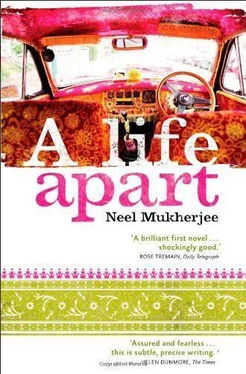The first meeting had seen Jane Fearfield, Iris Shepherd and Maud Gilby, excited and nervous as girls on the eve of their stepping-out ball, traverse a distance of more than three hundred miles by train and then received by the Maharajah’s carriage to be driven a liver-jostling five miles or so to the palace where the ladies would stay as royal guests for three nights. The ladies could not forget — how could they? they had been told so many times by so many different sets of people — the trouble James, a few other high-ranking Raj officials and His Highness the Maharajah of Mysore had been through to ensure this meeting. Rules had been broken on both sides, and rules, both spoken and unspoken, dense legions of them, had to be observed meticulously in this rare conjunction across the divide. The English ladies were to stick resolutely to the women’s quarters of the palace, they were not to drink alcohol or ask for it, there would be one Anglo and two Indian guards escorting them to the palace and staying in the servants’ quarters while they visited. The ladies had even been given a short, concentrated course on household customs in both Hindu and Muslim families so that they didn’t fall into easy errors, humiliating or offensive, to which an unfamiliarity with the dizzying sets of rules could easily have led them.
The meetings hadn’t gone well from the very outset, when Jane Fearfield, the newest and the youngest member of their informal little club, hadn’t been able to control her giggling fit at being garlanded with flowers as soon as they had stepped across the threshold.
Not a single lady in the Maharajah of Mysore’s family spoke or understood English. This was the first thing they had been told by a palace official — old and elaborately turbaned, with his eyes permanently focused on something an inch or so away from his feet — who was going to double as interpreter during the ‘honourable’ ladies’ visit to His Highness’s ‘humble abode’.
Never mind, Miss Gilby thought, while watching Jane fidget with the silk and muslin handkerchieves they had been given as honoured guests of the Maharajah, delicate pieces of cloth doused to saturation point with some heavy attar — roses or maybe jasmine, but at this concentration it was impossible to tell — which immediately made the head reel and the temples clutch with the slow beginnings of an obstinate headache. Never mind their inability to speak English, Miss Gilby thought; the main thing was to meet, exchange news and views and become familiar, although how this was going to be done without a common language, she did not ask herself, instead choosing to pin her hopes on the interpreter and even on Iris Shepherd who had boasted she could hold a conversation in Hindi and understand some rudimentary Urdu.
The room, or rather, the enormous hall where the meeting was going to take place was similarly perfumed, from a mixture of incense, attar , and the rose petals which had been strewn everywhere. The English ladies had tried to imagine what the insides of an Indian palace would be like; they had even read or been told about the ostentation of wealth and artistry in these palaces, but nothing had prepared them for this sumptuous feast of grandeur which made the senses swoon and assaulted them from so many quarters — the viscous fragrances, the monotone of the threnody being played on some mournful stringed instrument by a hidden player, the sea of colours, fabrics, jewels, ornaments, tapestry, curtains, rugs, pillars, chandeliers — that there wasn’t very much else to do except to obscure large sections of it in order not to drown in this gilded and marbled symphony of excess.
The Indian women, eleven in all — Miss Gilby had done a swift count while the seating formalities were being taken care of by the interpreter — were seated on piles of velvet cushions and fabrics arranged on the marble floor into a separate section of the room. Two chaise longues and four elaborate chowpaya s, all blue silk and gold embroidery and carved wood, had been arranged opposite this so that the two contingents of women faced each other. Between them, rose petals lying like wounds on the white marble, above them, the frozen crystal fountain of a chandelier. And the interpreter, somewhere out of sight, in one of the many shadows which stalked and lingered in the room despite the profusion of mirrors, chandeliers, candelabra, the fractured brilliance of glasswork.
For a while, all of Miss Gilby’s attention was taken by the flash and fire of the jewels on the Indian women. Even their clothes were heavy with gold threads and wires, teeth of pearl, their fingers and hands dipped into the heart of Hindustan’s treasures and just withdrawn. There was gold around their necks — chokers, collars, necklaces and chains, which fell in solid waves down their fronts, sometimes to their waists. They wore gold flowers on their toes, paisley-shaped earrings that covered their entire ears, and when they moved their hands, diamonds would carelessly catch a stray beam of light and send out an angry flare as if to remind everyone of their presence. And on the dark black skin of the women the metals and stones came into secret lives of their own which they hid from other, paler people. It was almost as if the darkness had put on a special fireworks show for the visitors — the jewellery accentuated their black skin while the fire of stones and metals made the skin a darker shade of night.
Miss Gilby hoped she hadn’t stared rudely at these decorated women for that was exactly what they were doing, unabashed, unashamed. Eleven pairs of huge, dark eyes stared unblinking at the English women as though they were exotic or mythical birds they had heard about all their lives and which had just been put up on captive display.
Dazzled, literally, by the jewels, Miss Gilby came late to the realization that one of the princesses, hardly more than a girl, eleven or twelve maybe, was giggling shamelessly at the foreigners while a stately queen, perhaps some dowager maharani, maybe even Her Highness herself, was trying to shut her up.
‘ Hanso mat ,’ she ordered, her kohl-lined eyes flashing fire. This was a woman born to command, her lazy, cushion-propped body breathing arrogance and majesty through every pore.
‘Don’t laugh,’ the interpreter dutifully translated, either unaware of the parties involved in that short exchange or untutored in the rules of interpreting.
The elderly woman now broke out into her own language clearly directed at the minister to translate. After she finished, he droned, ‘Her Highness welcomes the English ladies to her court on this auspicious day. She is honoured that such esteemed ladies are condescending to visit her humble abode and hopes that they find everything to their liking.’
Iris Shepherd replied with the necessary formalities. Quickwitted, that woman, Miss Gilby thought.
Then there was a long silence during which two of the Indian women started whispering to each other. A third joined in, leaning over one of the older women. This seemed to cause no offence to the woman who was being used as a physical support to join, as it were, the two whispering camps. And there seemed to be no attempt to disguise or hide the fact they were talking about the three Englishwomen: they stared and then turned around to whisper; often they looked at their English guests askance while breathing out their words into someone’s ear. While this open display of whispering was in progress, Miss Gilby decided to introduce her party.
‘I am sure Her Highness has been informed about us but I thought I would take this opportunity to do so ourselves.’ She pointed to Iris Shepherd and said, ‘This is Miss Iris Shepherd. . ’
Before she could finish, a peacock flew into the room from somewhere, stalked a few rose petals, and then, with a harsh scream that made Jane drop her scented handkerchiefs and start out of her chaise longue, deposited unfeasibly large amounts of faeces on the marbled floor and ran to the end of the room that gave out on to the courtyard.
Читать дальше












